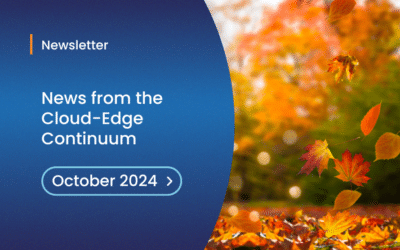Here’s our monthly newsletter, with the main news from the last month, including what you can expect in the coming months.
Technology
A new version of OpenNebula series 3 has been released, with version number 3.8.4. This version serves as a Service Pack, which allows users to maintain their current OpenNebula version as long as possible, preserving the stability and security of their data centers, as they transition from one OpenNebula Series to the next.
The OpenNebula team is working full steam for the upcoming 4.2 release (expect the beta version in two weeks). Multiple changes are being carried out in the VMware drivers, aimed to give more control over VMware resources, and a more fine grained management of VMware virtual machines. Special attention is being paid to the storage backend option for VMware, polishing existing combinations and dropping some of the less used ones. New drivers to interact with Xen 4.2 are being developed. These will enable the use of new Xen features like VHD images and a more tight HVM integration.
Another big effort is being carried out in OpenNebulaApps, in order to stabilize them and incorporate it into the main OpenNebula distribution. Special attention is being paid to the AppFlow component, with amazing features for service management, like for instance automatic elasticity.
The testing process is being revised as well, with a strong focus in extending it to cover the new functionality developed in OpenNebula, including integration with third party components. This is not a pretty job, but we think it is of utmost importance.
Community
Throughout the history of the OpenNebula project, the community has a great record of helping a great deal in the developments. Last month was no exception, thanks to the CentOS and OpenNebula installation testing and documentation day, where OpenNebula users helped in the irc in matters related to CentOS packaging.
Folks at OPTIMIS (Optimized Infrastructure Services) have contributed their toolkit to the ecosystem. OPTIMIS is an open source cloud computing research project that has recently published the final release of its toolkit (v3.0), which is now available in the OpenNebula Ecosystem. The OPTIMIS toolkit is fundamentally a cloud-enabling technology that ultimately allows users to schedule and automate the delivery of workloads to the most suitable venues (internal or external) based on policies such as trust, risk, eco-efficiency and cost.
A very dear (to us, at least 😉 ) contribution has been made by Alberto Zuin, in the form of a nice post comparing the simplicity of OpenNebula with that of the russian Soyuz. We completely agree with Alberto, it is important to stay in focus to deliver a quality product. Way to go!
The community is also a great resource to find out which direction our roadmap should take. We launched a survey to collect feedback from our community regarding what is their preferred interface for cloud consumers and how we should invest our resources in cloud API enhancement and development. The survey was open for two days receiving feedback from almost 200 OpenNebula clouds. Guided by these results, our plans for the near future are to enhance and extend our implementation of the AWS API and to offer OCCI compatibility through the rOCCI component.
We warmly welcome the Greater Denver OpenNebula Users Group! It is great to know that there are OpenNebula users out there gathering to talk about squeezing OpenNebula to get the most out of their infrastructures.
Outreach
We want to remind you about the First OpenNebula Conference. The Conference, based in Berlin between the 24 and 26 of september, will serve as a meeting point for OpenNebula cloud users, developers, administrators, builders, integrators and researchers and a unique opportunity for discussion and collaboration with other projects.
The first OpenNebula Conference will deliver its educational content through 6 keynotes, 2 tracks with 18 regular talks, 1 hands-on tutorial and 3 community sessions (see this page for more details).
-
Keynotes speakers include Daniel Concepción from Produban – Bank Santander Group, Zhihong Zhang from China Mobile, Steven Timm from FermiLab, André von Deetzen from Deutsche Post E-Post, Jordi Farrés from European Space Agency, Karanbir Singh from CentOS Project, and Ignacio M. Llorente and Rubén S. Montero from the OpenNebula Project.
-
The talks are organized in three tracks about user experiences and case studies, integration with other cloud tools, and interoperability and HPC clouds and include speakers from leading organizations like CloudWeavers, Terradue, Akamai, NetWays, INRIA, BBC, inovex, AGS Group, Hedera, NetOpenServices, KTH, CESNET or CESCA.
-
The Hands-on Tutorial will show how to build, configure and operate your own OpenNebula cloud.
-
The lightning talks, hacking and open space sessions will provide an opportunity to present lightning talks, discuss burning ideas, and meet face to face to discuss development.
Sponsorship opportunities are still available, and you can check the conference page for full details about registration.
During the following months, members of the OpenNebula team will be speaking in the following events:
- ISC Cloud’13 Hands on Tutorial, “Building your Cloud for HPC, here and now, in 3 hours!” Heidelberg, Germany 23-24 September,
- EGI Technichal Forum, Keynote , Madrid, Spain. 16-20 september
Remember that you can see slides and resources from past events in our Events page. We have also created a Slideshare account where you can see the slides from some of our recent presentations.



0 Comments